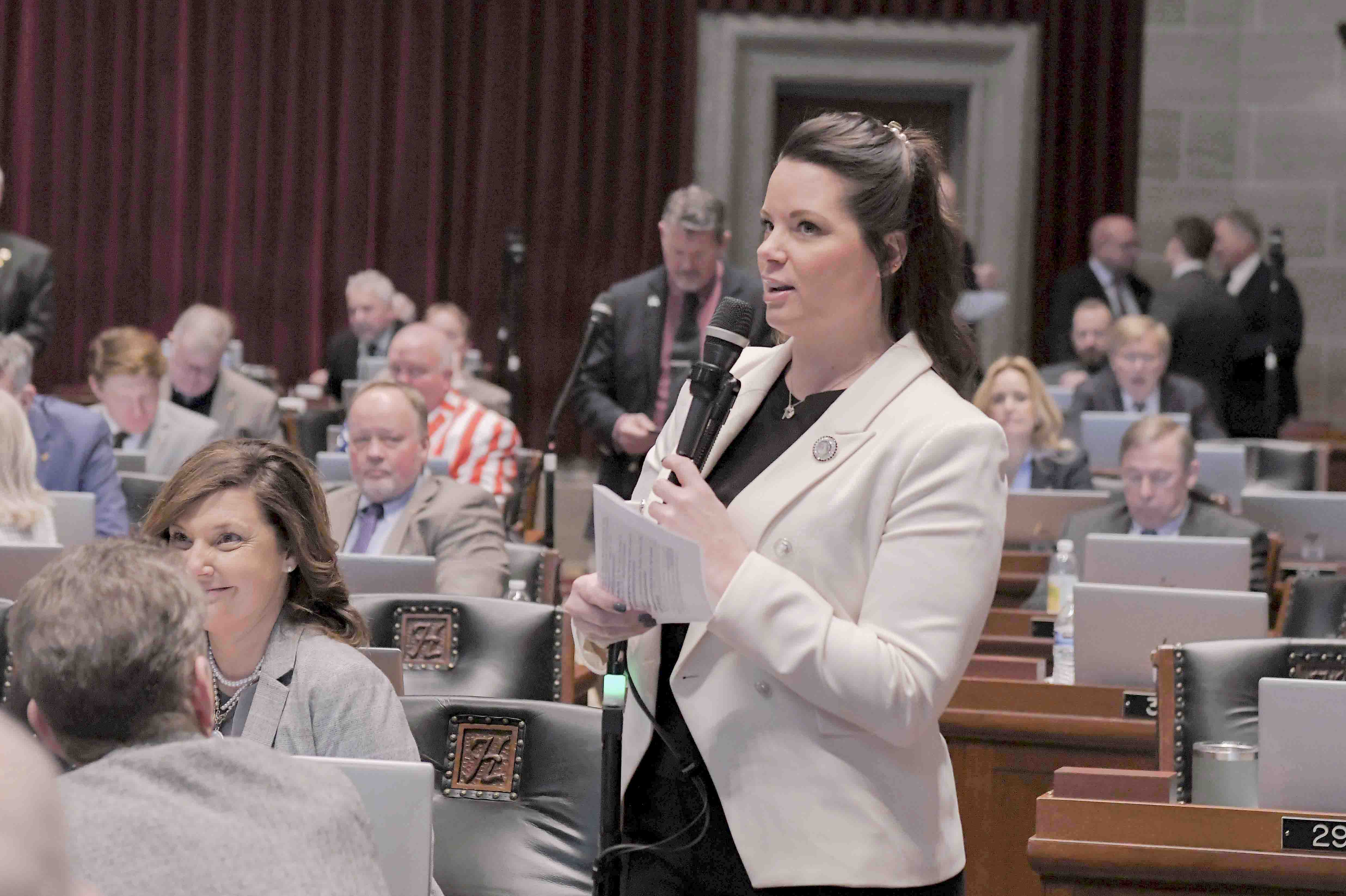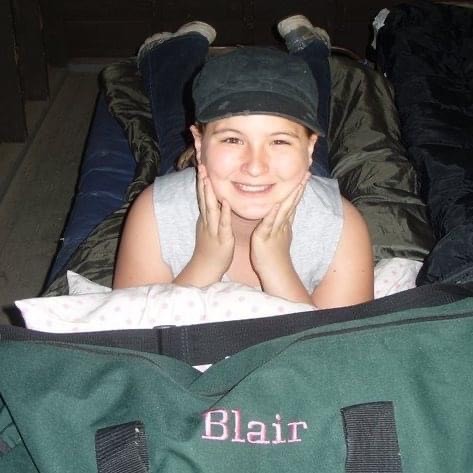Missouri House Democrats discussed what happened this week and looked ahead in the House.
Tag: Mark Sharp
VIDEO: House Democrat Press Conference for 03-27-2025
Missouri House Democrats talked about the bills worked on this week in the chamber and previewed next week’s budget work.
House plan would Accelerate Detection of Child, Animal, and Elderly Abuse by Connecting Investigators
A House committee advanced this week a plan that could save the lives of children, the elderly, and animals in the State of Missouri simply by having different types of investigators talk to one another.
House Bill 1298 would make those who investigate the abuse of children, the elderly, and other vulnerable persons mandated reporters of animal abuse and visa versa, and require the necessary cross training for those investigators.
“There’s a direct correlation between child abuse and elderly abuse in most cases, and animal abuse. In this bill we’re asking for agencies involved in any of the reporting on childhood abuse and animal abuse to cross-report for the other,” said bill sponsor Holly Jones (R-Eureka).
Jones shared with the House Special Committee on Urban Issues statistics to back up her proposal, and she said they are disturbing.
Committee Chairman Mark Sharp (D-Kansas City) said the proposed change could lead to cases of abuse being discovered earlier by authorities.
The relationship between children and their pets is recognized as treasured and crucial to emotional development, and the development of empathy, responsibility, and social skills. Aislinn McCarthy with the Missouri Alliance for Animal Legislation said it is that much more tragic, then, when a child’s pet becomes a target of abuse.
Jackson County Assistant Prosecuting Attorney Devon Tarantino dealt with special victims cases for four years. She said animal abuse investigators are, indeed, often the first authorities to visit a home in which children are being abused.
Tarantino said delays in detection of abuse in a home are not always the result of investigators not having yet witnessed it. Often when investigators are present, they are not told about abuse. She said HB 1298 could make a difference in those situations as well.
The committee heard similar testimony from Ashley Stanley, the Director of Community Education and Outreach at Wayside Waifs Animal Shelter in Kansas City. She told the committee she has encountered many awful and sobering stories of animal abuse that were made more heartbreaking by how children were affected.
“For children, especially, the first red flags that abuse or neglect may be happening in the home can be spotted in the conversations that they have about their animals.“
Stanley joined the advocates who told legislators that Jones’ proposal could save lives.
The committee voted 6-0 to advance HB 1298. It faces another committee vote before it could be considered by the full House.
VIDEO: House Democrats media conference 03-06-2025
Missouri House Democrats discussed issues and legislation from this week and answered reporters’ questions.
VIDEO: House Democrats’ media conference for 02-20-2025
Missouri House Democrats spoke to reporters and fielded questions after the House wrapped up work for the week.
VIDEO: House Democrats’ End of Week Press Conference
House Democrats fielded reporters’ questions after the close of legislative work for the week:
‘Law’ at last: After 13 years, Blair’s Law, criminalizing ‘celebratory’ gunfire, is signed
July 4 was the 13 year anniversary of the death of 11 year-old Blair Shanahan Lane. Five days later legislation criminalizing “celebratory gunfire,” such as what ended her life, was signed into law.
That signing was the culmination of 13 years of work by a determined mother who responded to the senseless death of a daughter by refusing to give up.
“It’s just what got me out of bed … knowing I could make something happen,” Michele Shanahan DeMoss said after the law bearing her daughter’s name was at long last signed into effect.
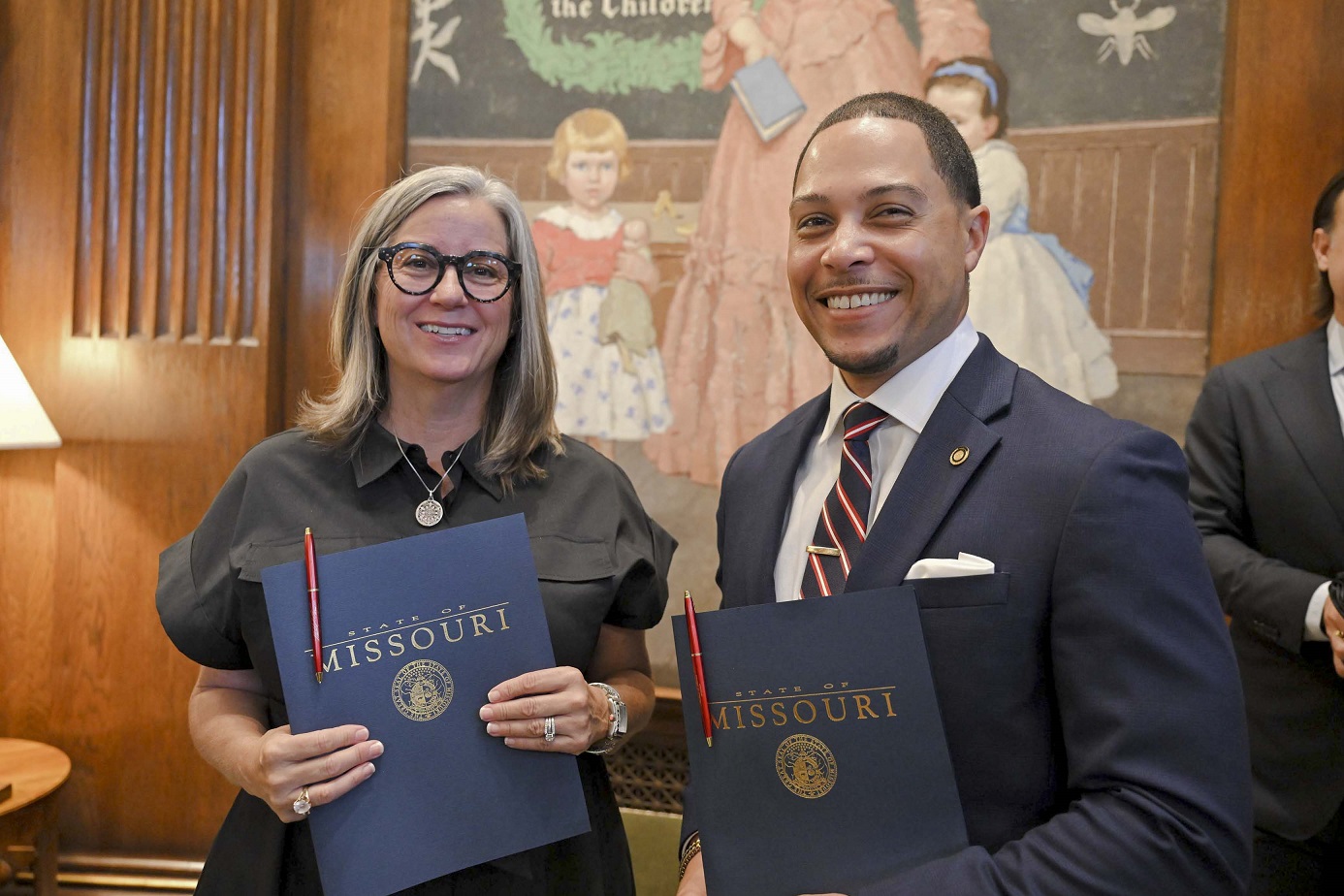
Up to one moment on Independence Day, 2011, Blair, Michele, and the rest of the family were celebrating the holiday and all was normal. The next moment, Blair was suddenly laying on the ground, and what Michele had known as “normal” was ended.
Blair had been struck by one of many bullets fired carelessly into the air by a person at a party more than half a mile away. She died the next day.
The man who fired that gun served 18 months in prison for involuntary manslaughter. There was no state law that addresses what is often called “celebratory gunfire,” until Tuesday when Governor Mike Parson (R) signed Senate Bill 754, which includes “Blair’s Law.”
Blair’s Law makes the unlawful discharge of a firearm within or into the city limits of a community a class A misdemeanor for a first offense, a class E felony for a second offense, and a class D felony for subsequent instances.
It is a change that has received broad, growing, and consistently bipartisan support every year it was proposed. Representative Mark Sharp (D-Kansas City) joined five years ago the list of lawmakers to sponsor it in the House. He said to see it finally signed is a huge relief.
“I had a good chance to see other folks lead the way and lead the charge on Blair’s Law and I picked up where they left off,” Sharp said Tuesday.
Also sponsoring Blair’s Law this year is Representative Sherri Gallick (R-Belton), who was inspired by Michele after meeting her while knocking doors during Gallick’s run for office.
“I am extremely happy for Michele. She did this for Blair to save lives and bring more awareness,” Gallick said.
This year’s version of Blair’s Law was the second to reach the desk of Governor Parson. He vetoed last year’s version, siting objections not with it, but with other provisions within the same bill. Before signing SB 745 yesterday he addressed that action.

“I’m sure they were disappointed,” Parson said regarding last year’s veto. “I thank you for staying the course to do what is right because you’re going to help somebody else out, and at the end of the day and that’s what we’re all supposed to be doing … and I can tell you I will be very proud to sign this on your behalf today.”
When it was vetoed last year, Sharp and other legislators who had worked on it immediately assured DeMoss that it would be a priority in this year’s session. DeMoss never lost hope and never criticized those involved in the process.
As she, Sharp, and others have observed often, each year that the bill didn’t pass was another year that it was refiled, and each time the attention it received grew. Supporters hope that growing publicity discouraged at least some incidents of celebratory gunfire.
Sharp said in his district and others in the state, however, incidents are still occurring.
Gallick agreed, “Gun ownership is a responsibility. Guns are not toys and they should not be used recklessly to celebrate. We now have stricter penalties.”
The Kansas City Police Department said that during last week’s Independence Day holiday period of 6 p.m. Wednesday to 6 a.m. the next morning, there occurred one casualty incident, four aggravated assaults, and three incidents of property damage, all of which were believed to be related to celebratory gunfire or possibly fireworks. The Department’s Shot Spotter technology, during that period, detected 280 rounds of gunfire within the Kansas City limits. Another 110 reports of shots fired were called in to the Department and 911 dispatchers.
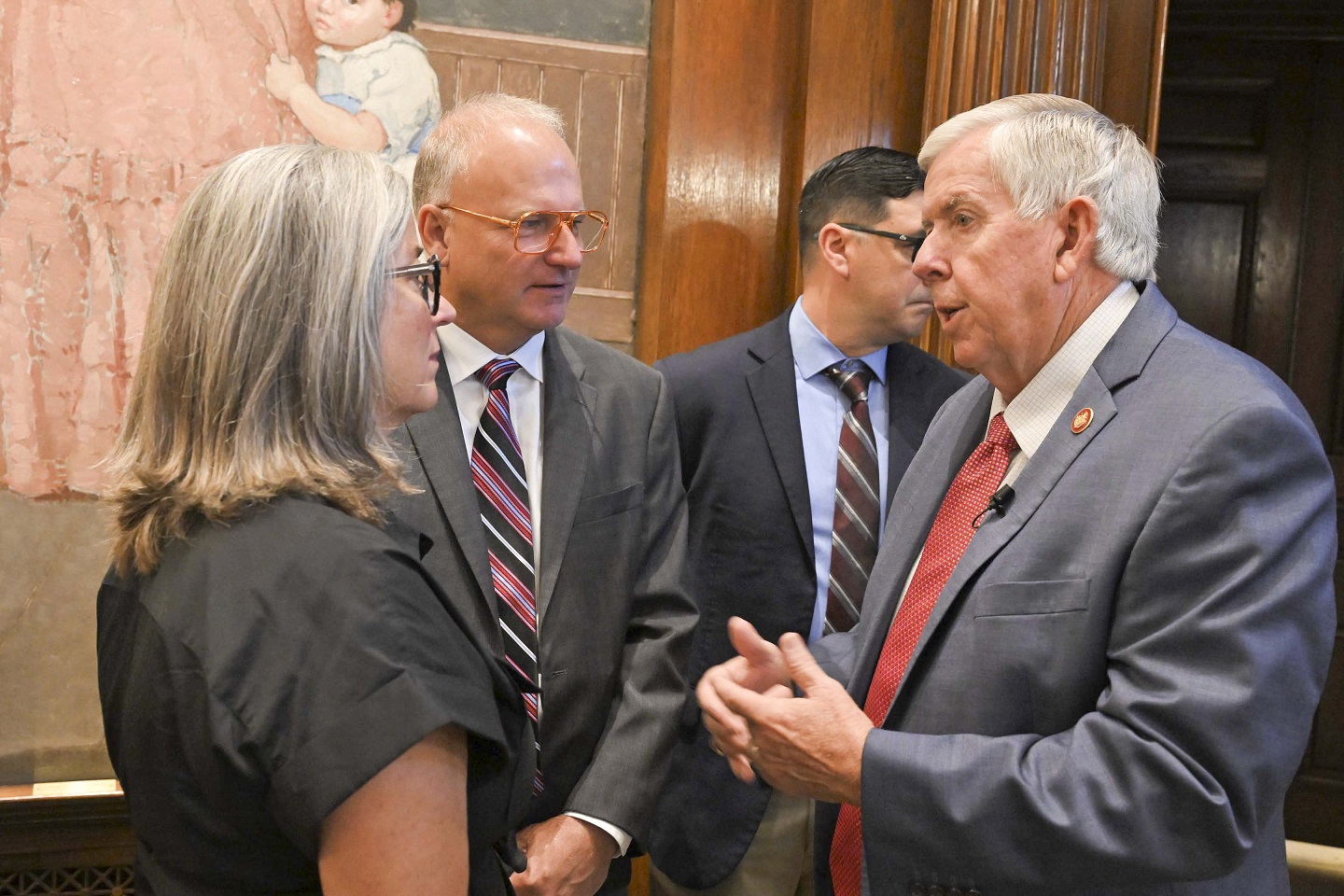
DeMoss said Tuesday that she is not done. She has always felt called to her advocacy, and she does not know where that will lead her next, but she feels sure something is coming.
“I need to get through today and the rest of this week, and maybe the rest of this month,” DeMoss said. “I know that [what’s next] will reveal itself to me. For 13 years it’s got me out of bed so there is something that’s next and I am confident in that.”
During the past thirteen years DeMoss has often said that she talks to Blair, and feels Blair with her, especially as she lobbied for this law. She felt her again on the day of the signing. She noticed something that frequent Capitol goers will recognize: décor in the stairwells with an “M” for Missouri alternating with a Hawthorn blossom, the result of which looks very much like the word “Mom.”
‘Blair’s Law’ Passed Again, Sponsors Confident it will Become Law
A mother’s nearly 13 year quest for justice for her daughter might have finally reached its end, with one of the bills passed at the end of this year’s regular legislative session.
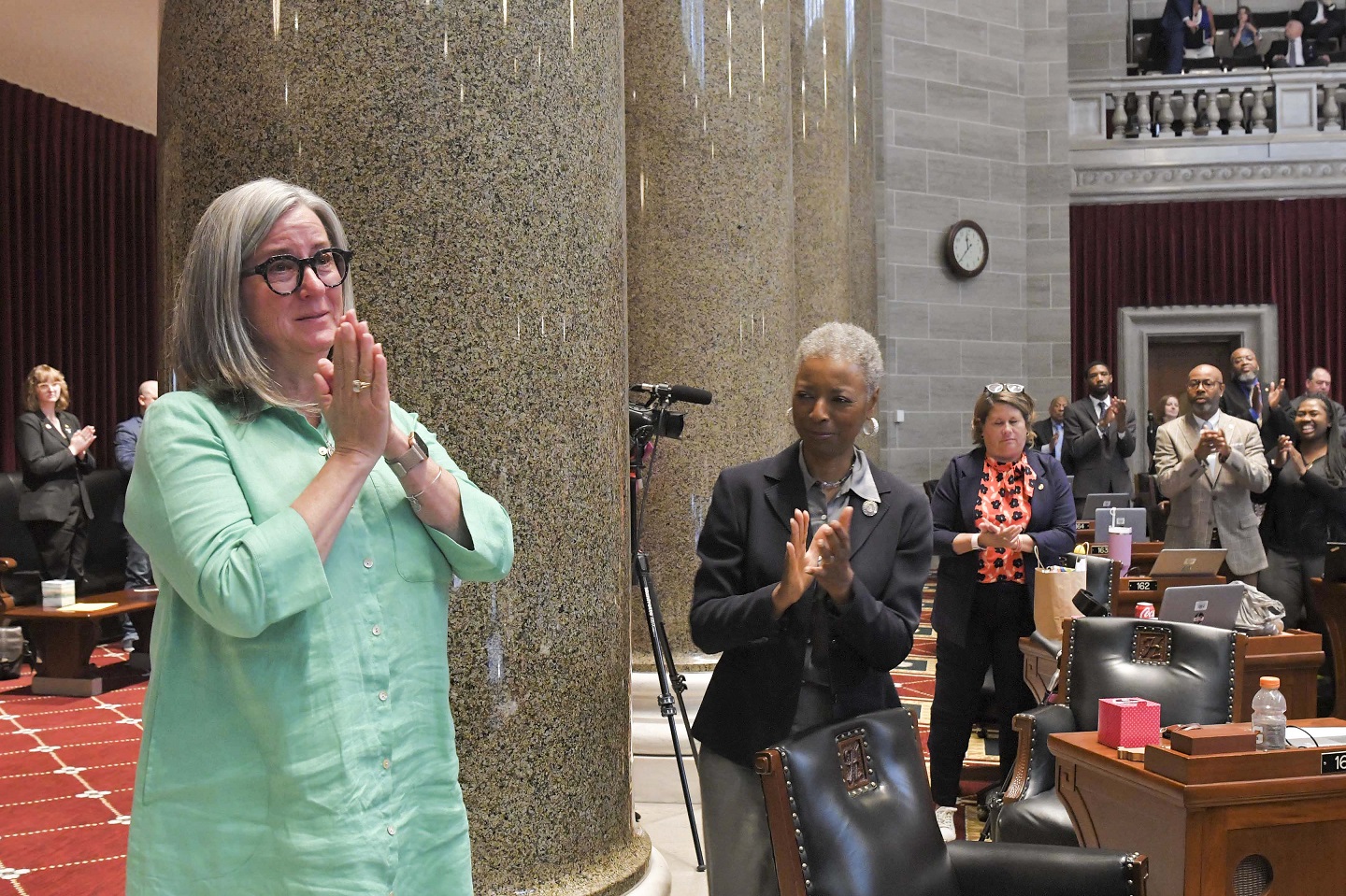
On July 4, 2011, 11 year-old Blair Shanahan Lane was struck by a bullet fired carelessly into the air by a person more than half a mile away. Blair died the next day. The man who fired that gun served 18 months in prison for involuntary manslaughter. There is no state law that addresses what is often called “celebratory gunfire.” Every legislative session since her daughter’s death, Michele Shanahan DeMoss has come to Jefferson City in an effort to change that.
On the final day of the 2024 session the legislature gave final passage to a bill that included Blair’s Law, to criminalize the careless discharge of a firearm in or into the limits of a municipality.
“I woke up this morning and I said, ‘This is the day. Let’s do it,’ and I just felt, without any hesitation, that it would happen,” Shanahan DeMoss said of that morning, and how she felt before heading to the Capitol. She was in the House when the final vote was taken.
Mark Sharp (D-Kansas City) was one of the sponsors of Blair’s Law, as he has been for the past five years. He has long seen the passion and emotion Shanahan DeMoss pours into the effort, and it became personal for him as well.
“It’s been so important to my community,” Sharp said. “Just in my own neighborhood, alone, on days like Fourth of July or New Year’s Eve and we have an almost three year-old daughter, and sometimes we don’t even feel comfortable sitting in our living room on the Fourth of July or New Year’s Eve because of the amount of gunfire that we can so easily hear. It sounds like it’s on your own street, it’s so close it comes to feel like it’s in your backyard. It’s very scary. People have been hurt and killed, officers have been hit by bullets that come down, it’s just incredibly scary. We hope that our prosecutor and our chief of police will work together to make some arrests.”
Representative Sherri Gallick (R-Belton) also sponsored Blair’s Law this year. She first heard about it directly from Shanahan DeMoss after knocking on her door while campaigning. She decided, then, that she would also push for the legislation.
Blair’s Law would specify that a person is guilty of unlawful discharge of a firearm if they, with criminal negligence, discharge a firearm in or into the limits of a municipality. A first offense would be a class “A” misdemeanor which carries up to a year in jail and a fine of up to $2,000; a second time would be a class “E” felony carrying up to four years in prison; and third and any subsequent offense would be a class “D” felony, punishable by up to seven years in prison.
The first time Blair’s Law was truly agreed to by the House and Senate was in 2023, but it was part of a bill that included other provisions to which Governor Mike Parson (R) had objections, and because of those he vetoed it.
Sharp and Gallick anticipate it will be signed this year.
“Last year was a little different because it was the first time passing Blair’s Law, and it was a little surreal, so when he vetoed it I wasn’t completely surprised,” Sharp said. “This year I have every reason to think the governor’s going to sign it. It’s been a very emotional day for me personally.”
Even after going through the emotional high to low of the first ever passage of Blair’s Law last year followed by the disappointment of its veto, Shanahan DeMoss did not hesitate to come to the Capitol multiple times this year to push for it again.
Supporters note that one of the positives of the proposal not having passed for so many years is that it continued to garner attention throughout that time. That publicity likely prevented at least some incidents of people firing a gun into the air.
Even if the governor signs Blair’s Law this year, Shanahan DeMoss, Gallick, and Sharp say they want to keep that attention up. That is especially true as the Independence Day holiday approaches, as it is both the anniversary of Blair’s death, and it remains a time when incidents of “celebratory gunfire” spike.
Last year the Kansas City Police Department’s SoundSpotter system – sound capturing technology that the Kansas City Police Department uses to identify potential gunshots – detected 193 rounds fired between 6 p.m. on July 4 and 6 a.m. on July 5.
“I don’t think that [Shanahan DeMoss is] just going to say, ‘Okay, this is done,’ because that’s not who she is,” Gallick said. “She will continue to bring awareness to it. I think it’s up to us, and the media, to be honest with you. Especially around the Fourth of July, but even with celebrations with the Chiefs and New Year’s and other things that go on, people should not be firing guns recklessly.
Gallick and Sharp are the latest in a long line of former House members who have sponsored Blair’s Law since 2011.

“I want them to know that I celebrate them,” DeMoss said of them, and of all the legislators who have carried the measure. “I celebrate that they put in the effort, that they listened to me, which I know at times is probably hard because I have a tendency to go on and on until I know I’ve driven my point home.”
Blair’s legacy continues in other ways, as well. Six of her organs went to five people, and her mother runs a charity in her name. Blair’s Foster Socks gives socks and other items to children in need.
Blair’s Law was sent to Governor Parson as part of Senate Bill 754. He can sign it into law, veto it, or allow it to become law without his action.
Shanahan DeMoss, like Sharp and Gallick, believes he will sign it, and said if a signing ceremony is held, “I will be there.”
VIDEO: House Democrats’ end of session media conference
House Democrats addressed reporters and fielded questions after the close of the 2024 regular session, today:
Bipartisan Array of Bills from 13 House Members would Cut Taxes on Food, Diapers, or Feminine Hygiene Products
Many House lawmakers think Missourians need a break in the taxes they pay to the state. Thirteen House members, nearly evenly split across party lines, have proposed doing so by cutting taxes on necessary products, particularly diapers, feminine hygiene products, and food.
As the legislature enters the final few weeks of its session those bill sponsors are hoping their proposals will get some traction, perhaps as amendments to other proposals, or at least legislative hearings that could spur movement in future years.
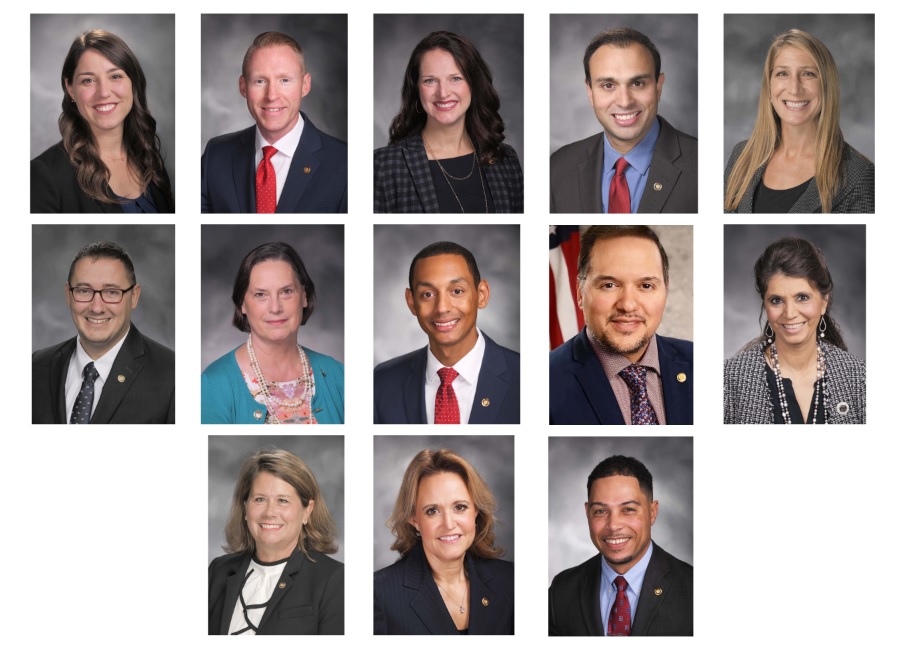
None of these proposals have been referred to committees.
Missouri is one of only 13 states in the nation that taxes food. Three neighboring states do not tax food, and Kansas will join that number next year. St. Charles Republican Adam Schnelting is one of the legislators proposing that Missouri do the same.
Schnelting said as inflation has skyrocketed in recent years, he has hoped that his idea would catch on amount his House colleagues.
“My own family, my daughter is 6 years old, my son is 18 months old, we have a growing family and we feel it in our own pocketbook. I know I’ve got a lot of constituents and a lot of people back home that feel it in their pocketbook. If people in my district have to live within their means then so does the government,” Schnelting said. “My wife and I were spending almost $1,000 a month on food … every little bit helps and adds up. If you’re talking several hundred dollars that can go toward over things, like diapers.”
Lone Jack Republican Chris Sander said in districts such as his, which is near the border with Kansas, Missourians are taking advantage of the lower rates some neighboring states offer.
Robert Sauls (D-Independence) proposes exempting food not only from the state sales tax of 1.225 percent, but also from local sales and use taxes, which in some parts of the state drive the rate up to more than eight percent.
Representative Chris Dinkins (R-Lesterville) said she and other legislators are seeing more and more of their constituents struggling, and they want to help.
“I think we’re always looking at ways to help the citizens of Missouri,” Dinkins said. “When you look at people’s income status, you find that your lowest income people spend the largest percentage of their income on food, so they are the ones that’s most impacted by the sales tax. They spend around 30 percent or more of their income on food, whereas your middle income people only spend a little over 10 percent, so we’re impacting the people that need it the most, and we’re trying to help those that need it the most.”
Missouri taxes diapers and feminine hygiene products at 4.225 percent. Several neighboring states tax those products at a greater rate, but three don’t tax feminine hygiene products at all and one does not tax diapers.
The 4.225 percent rate is often called a “luxury” tax, as it is applied to items that are deemed non-essential. That doesn’t sit well with many lawmakers, including Representative Mark Sharp (D-Kansas City, who proposes taxing such items at the lesser 1.225 percent.
“They should not be taxed at a luxury rate … so reducing them down to a food sales tax, I believe, is the very least that we can do,” said Sharp. “Many states have gone as far as just removing the tax altogether, so we have to something to at least move the needle.”
Others, like Republican Wendy Hausman (St. Peters) want to take the extra step of eliminating the state sales tax on those items, altogether.
Hausman, who is in her second year as a freshman legislator, said the idea was brought to her by fellow members of a businesswomen’s group, Little Black Book.
“We want to make sure that we’re supporting Missouri families by making it easier for them, especially in a day and age where they try to tax you and gouge you everywhere. We need to figure out ways to try to give people and families relief,” said Lake St. Louis Republican Representative Justin Hicks. “We all know that females need feminine hygiene products, that’s a given, and with people having kids out there we all know that diapers are usually a major expense to a family.”
Many legislators and advocates point out that difficulty affording or providing necessary products has a ripple effect, contributing to issues with both mental and physical health.
“From a parent’s perspective, not being able to provide an essential item for their baby [such as diapers] has a mental toll, so it impacts their mental aspect. Also [as] a workforce issue, on average, parents in diaper need miss 5.1 days of work a month because they can’t afford diapers to send to child care with their child, so this is a workforce issue,” said Representative Patty Lewis (D-Kansas City). “Then not to forget the physical health aspect that it has on a baby, sitting in saturated diapers hours after hours. From UTIs to diaper rash, sometimes if they’re not cured with over-the-counter medicine they have to go to the physician or the pediatrician, so additional time off work for the parents and additional cost for the parents as well, and then there can be long-term effects, from renal failure or renal insufficiency, for these babies.”
St. Louis Democrat Barbara Phifer points out, “Period products, especially, are very intimate and personal. If you think about young girls who are going through puberty, and if they don’t have access to those products, their school participation drops dramatically.”
Opposition to these ideas in past years has come from local governments, who say cutting taxes on these products jeopardizes services they provide, such as emergency responders.
“I think that kind of deterred it,” said St. Louis Democrat Jo Doll. “Hopefully this year we can finally get [the tax cut on diapers and feminine hygiene products] across the finish line. I think the biggest problem is that it always gets attached to something and whatever it’s attached to falls apart.”
House Democrat leader Crystal Quade’s (Springfield) plan to cut taxes on food would let Missourians vote on a number of tax changes, including a tax on private planes and yachts, and create a fund in the state’s coffers to help local governments transition.
“Missourians are suffering right now when it comes to making ends meet, and it’s our job to come up with solutions that help everyone,” Quade said. “It’s up to us to figure out ways to make up those losses and that shouldn’t be a burden on the regular taxpayer.”
Representative Maggie Nurrenbern (D-Kansas City), who is in her fourth year on the House Budget Committee, said the state can afford to reduce these taxes.
“We’re looking at record budgets and we have a record surplus still in the state treasury. What can we actually do to pass on cost savings to working families?” said Nurrenbern. “I hate to see a mom standing in the line making that decision, ‘Do I buy this pack of diapers or that gallon of milk,’ and those are the decisions our families are faced with every single day, and it’s time now, to pass that savings on to families and cut the state portion of sales tax on essential items.”
Chesterfield Republican Ben Keathley said the growth in support for these proposed sales tax cuts is a direct response to inflation hikes over the past several years.
While 13 legislators contributed to this article, Keathley said more will get on board the longer such ideas are not passed.
